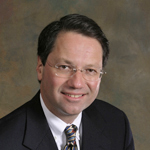 Craig Callewart, MD, a spine surgeon with Methodist Hospital for Surgery in Addison, Texas, talks about how the upcoming fiscal cliff deal will impact spine practices and the steps surgeons can take to shape healthcare policy in the future.
Craig Callewart, MD, a spine surgeon with Methodist Hospital for Surgery in Addison, Texas, talks about how the upcoming fiscal cliff deal will impact spine practices and the steps surgeons can take to shape healthcare policy in the future.Q: What do spine surgeons need to know about the looming fiscal cliff discussions?
Dr. Craig Callewart: The government runs out of money in a month and the debt ceiling comes at that time. There's no way for the government to pay its obligations and no feasible way to prioritize what checks are going out, so it's expected that providers who dedicated their services for Medicare and Medicaid patients won't be paid. We all need to be prepared for several weeks of less or no pay.
Q: Are there any plans on the national level to mitigate these negative affects?
CC: There is really no plan "B"; they just aren't going to pay and we have to have our finances in order so we can withstand weeks of non-payment or slow payment. There are two things spine surgeons can do to mitigate the impact: one would be to make sure that coding is done on time and bills go out promptly so that insurance companies will pay on time, which will maximize cash flow; the other piece of the equation is to minimize expenses, so many surgeons will chose to defer certain expenses, such as profit sharing plans that are part of the retirement package.
Q: How have these changes and uncertain economy had an impact on private practice spine surgeons?
CC: For most spine surgeons, approximately a third to a half of their expense is employee related. Right now, I'm debating whether to hire a new employee. I have deferred that decision because my personal income tax will increase and now I'm expecting to have low cash flow in February and March. Now, instead of employing another person, I'm choosing to pay overtime or use part time employees. I think most spine surgeons will feel a significant hit and increase on tax expense, mainly because deductions are going to be phased out above certain income thresholds.
It remains to be seen exactly which deductions will be phased out and at what income thresholds; it's the wild card role waiting for the rules and regulations to be written. Payroll taxes are returning to their full force and that will be another hit. This also contributed to my decision not to take on another employee, which is contrary to what Washington wishes to happen.
Most of us are the prototype for what Washington wants to empower; small businesses are where economic growth is expected to happen. Yet the current tax environment penalizes us for working hard and being productive. Sometimes I wonder whether it's worth it to keep working this hard and taking on new patients, which is stressful when the federal disincentives continue to increase.
Q: Over the next few years, will spine surgeons be able to keep their practice doors open?
CC: It's harder to maintain the amount of income for the work powers invested. More and more of my colleagues are selling their practices to the hospitals or other ventures. I also watch many of my colleagues trying to create a medical device so they can quietly withdraw from the practice of medicine; most of these people are at the prime of their career, which is sad for the country.
Q: Is there any way spine surgeons can have an impact on healthcare policy? How have you become involved?
CC: For better or worse, I have worked six sessions in our state legislature, which equals 12 years. Most legislators, both at the state and federal levels, are attorneys with very little experience in medicine or business, yet they are making decisions that generally impact us all. Physicians are beginning to wake up and run for political office. I would encourage those of us who can still make a change to become personally involved with our local legislatures, Congressmen and Senators, and work on their campaigns.
One of the points I try to bring across to them is we don't really have a healthcare access problem in America as much as we have a healthcare payment problem. Most don't understand the concept that a lot of us do charity work because it's a foreign concept to a business man, but that's the basic tenant of medicine. The real problem is the patient system needs to be fixed.
Lowering payments doesn't reduce expenditure; oftentimes it has a paradoxical effect of increasing expenditure because surgeons and hospitals work harder to cover their expenses.
Q: What advice do you have for surgeons who are looking to maximize their time and impact on elected officials?
CC: If surgeons try to reach their representatives during the heat of the battle when bills are being considered, it's hard to deliver the message unless the physician has strong working relationships with that elected official. The time to initiate that relationship is during the campaign process or during session breaks. A key thing to do is find out who their healthcare associate or liaison is and get to know that staffer. Visit with them and teach them; they are often very young people and greatly ambitious, but don't have much experience in healthcare.
Right now, it's coming down to crunch time. Our elected officials need to hear from us, otherwise they will hear from other government agencies.
More Articles on Spine Surgery:
5 Healthcare Reform Threats to Spine Surgeons & How to Overcome Them
8 Ways to Combat Spine Surgery Claim Denials
5 Spine Surgeons on Operating Room Innovation


